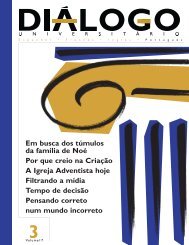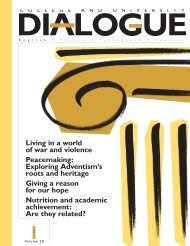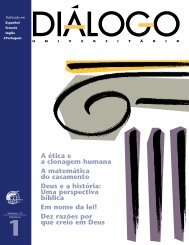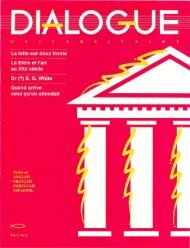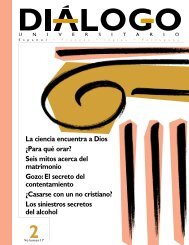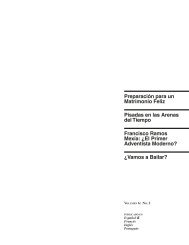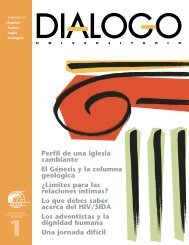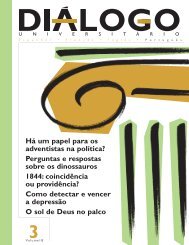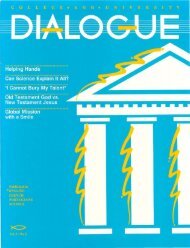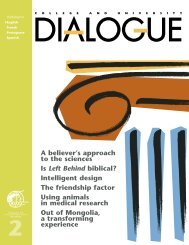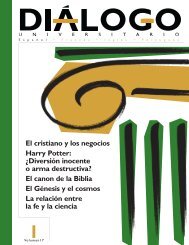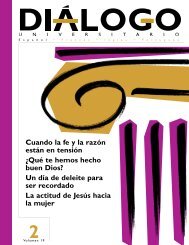Faith, reason, and the educated Christian Creationism - College and ...
Faith, reason, and the educated Christian Creationism - College and ...
Faith, reason, and the educated Christian Creationism - College and ...
Create successful ePaper yourself
Turn your PDF publications into a flip-book with our unique Google optimized e-Paper software.
ple, <strong>the</strong> existence of God, <strong>the</strong> objective<br />
moral law). Truths ascertained by <strong>reason</strong><br />
<strong>and</strong> not by faith are those not directly<br />
revealed by God but discovered by human<br />
<strong>reason</strong> (for example, physical laws,<br />
ma<strong>the</strong>matical formulas).<br />
C. S. Lewis, <strong>the</strong> renowned <strong>Christian</strong><br />
apologist, argued that in order to be truly<br />
moral, human beings must believe<br />
that basic moral principles are not dependent<br />
on human conventions. These<br />
concepts possess a transcendent reality<br />
that makes <strong>the</strong>m knowable by all humans.<br />
Lewis fur<strong>the</strong>r maintained that <strong>the</strong><br />
existence of such principles presupposes<br />
<strong>the</strong> existence of a Being entitled to promulgate<br />
<strong>the</strong>m <strong>and</strong> likely to do so.<br />
If <strong>the</strong> real world can be comprehended<br />
by human <strong>reason</strong> on <strong>the</strong> basis of investigation<br />
<strong>and</strong> experience, it is <strong>the</strong>n an<br />
intelligible world. The amenability of this<br />
world to scientific inquiry both at <strong>the</strong> cellular<br />
<strong>and</strong> galactic levels allows human<br />
beings to discover <strong>the</strong> laws that provide<br />
evidence for intelligent design of <strong>the</strong><br />
most intricate kind. This extremely<br />
elaborate design of all facets of <strong>the</strong> universe,<br />
which makes possible intelligent<br />
life on this planet, speaks of a Designer.<br />
Therefore, religious experience <strong>and</strong><br />
moral conscience can be seen as signs of<br />
<strong>the</strong> existence of <strong>the</strong> same Being that scientific<br />
research envisions as <strong>the</strong> intelligent<br />
Designer of <strong>the</strong> cosmos <strong>and</strong> <strong>the</strong><br />
Sustainer of life. 7<br />
Reason can help us move from underst<strong>and</strong>ing<br />
to acceptance <strong>and</strong>, ideally,<br />
to belief. <strong>Faith</strong>, however, is a choice of<br />
<strong>the</strong> will that goes beyond <strong>reason</strong>. Careful<br />
thinking, under <strong>the</strong> Holy Spirit’s<br />
guidance, may remove obstacles on <strong>the</strong><br />
way to faith. Once faith is already<br />
present, <strong>reason</strong> may streng<strong>the</strong>n religious<br />
commitment. 8<br />
<strong>Faith</strong> <strong>and</strong> <strong>reason</strong> in biblical<br />
perspective<br />
The Hebrew worldview, as reflected<br />
in <strong>the</strong> Old Testament, conceived of human<br />
life as an integrated unit that included<br />
belief <strong>and</strong> behavior, trust <strong>and</strong><br />
Dialogue 15:3 2003<br />
thought. During most of <strong>the</strong>ir existence,<br />
<strong>the</strong> people of Israel accepted as a matter<br />
of fact <strong>the</strong> reality of God, whose revelations<br />
were documented in <strong>the</strong>ir Scriptures<br />
<strong>and</strong> whose supernatural interventions<br />
were evident in <strong>the</strong>ir history. For<br />
<strong>the</strong>m, <strong>the</strong> enemy of belief in <strong>the</strong> true<br />
God was not unbelief but <strong>the</strong> worship of<br />
pagan deities, mere products of misguided<br />
human imagination. Their goal<br />
was not <strong>the</strong>oretical knowledge but wisdom—<strong>the</strong><br />
gift of right thinking that<br />
leads to right choosing <strong>and</strong> right living.<br />
“‘The fear of <strong>the</strong> Lord is <strong>the</strong> beginning<br />
of wisdom, <strong>and</strong> knowledge of <strong>the</strong> Holy<br />
One is underst<strong>and</strong>ing’” (Proverbs 9:10).<br />
The New Testament reflects <strong>the</strong> transition<br />
toward a different cultural context,<br />
in which Hebrew mono<strong>the</strong>ism had<br />
already become fragmented into various<br />
Jewish sects, <strong>and</strong> had also been influenced<br />
by Greco-Roman poly<strong>the</strong>ism, emperor<br />
worship, <strong>and</strong> agnosticism. As <strong>the</strong><br />
early <strong>Christian</strong> Church interacted with<br />
this religio-philosophical environment,<br />
it began to articulate <strong>the</strong> distinction <strong>and</strong><br />
<strong>the</strong> relationship between faith <strong>and</strong> <strong>reason</strong>,<br />
granting to faith <strong>the</strong> position of<br />
privilege in <strong>the</strong> life of <strong>the</strong> believer.<br />
Bible teaching with respect to faith<br />
<strong>and</strong> <strong>reason</strong>, particularly in <strong>the</strong> New Testament,<br />
may be summarized in <strong>the</strong> following<br />
propositions:<br />
1. The Holy Spirit both awakens<br />
faith <strong>and</strong> illumines <strong>reason</strong>. If it were<br />
not for <strong>the</strong> persistent influence of <strong>the</strong><br />
Holy Spirit on human consciousness, no<br />
one would ever become a <strong>Christian</strong>. In<br />
our natural condition we do not seek<br />
God (Romans 3:10, 11), acknowledge<br />
our desperate need of His grace (John<br />
16:7-11), or underst<strong>and</strong> spiritual things<br />
(1 Corinthians 2:14). Only through <strong>the</strong><br />
agency of <strong>the</strong> Holy Spirit we are drawn<br />
to accept, believe, <strong>and</strong> trust in God<br />
(John 16:14). Once this miraculous<br />
transformation has occurred (Romans<br />
12:1, 2), <strong>the</strong> Holy Spirit teaches us (John<br />
14:26), guides us “into all truth” (John<br />
16:3), <strong>and</strong> allows us to discern truth<br />
from error (1 John 4:1-3).<br />
2. <strong>Faith</strong> must be exercised <strong>and</strong> developed<br />
all through life. Each human<br />
being has been given a “measure of<br />
faith” (Rom. 12:3)—that is, <strong>the</strong> basic capacity<br />
to trust in God—<strong>and</strong> each <strong>Christian</strong><br />
is encouraged to grow “more <strong>and</strong><br />
more” in faith (2 Thessalonians1:3). In<br />
fact, “without faith it is impossible to<br />
please God, because anyone who comes<br />
to him must believe that he exists <strong>and</strong><br />
that he rewards those who earnestly<br />
seek him” (Hebrews 11:6). Hence <strong>the</strong><br />
plea of an anguished fa<strong>the</strong>r to Jesus, “‘I<br />
do believe; help me overcome my unbelief!’”<br />
(Mark 9:24) <strong>and</strong> <strong>the</strong> insistent request<br />
of <strong>the</strong> disciples, “‘Increase our<br />
faith!’” (Luke 17:5).<br />
3. God values <strong>and</strong> appeals to human<br />
<strong>reason</strong>. Although God’s thoughts<br />
are infinitely higher than ours (Isaiah<br />
55:8, 9), He has chosen to communicate<br />
intelligibly with humankind, revealing<br />
Himself through <strong>the</strong> Scriptures (2 Peter<br />
1: 20, 21), through Jesus Christ who<br />
called Himself “<strong>the</strong> truth” (John 14:6),<br />
<strong>and</strong> through nature (Psalm 19:1). God<br />
wants to “<strong>reason</strong> toge<strong>the</strong>r” with us (Isaiah<br />
1:18). Jesus frequently engaged His<br />
listeners in dialogue <strong>and</strong> reflection, asking<br />
for a <strong>reason</strong>ed response (see, for example,<br />
His conversation with Nicodemus,<br />
John 3; <strong>and</strong> <strong>the</strong> Samaritan woman,<br />
John 4). At <strong>the</strong> request of <strong>the</strong> Ethiopian<br />
official, Philip explained a Messianic<br />
prophecy found in Scripture so that he<br />
might underst<strong>and</strong> <strong>and</strong> believe (Acts<br />
8:30-35). The believers in Berea were<br />
praised because <strong>the</strong>y “examined <strong>the</strong><br />
Scriptures every day to see if what Paul<br />
said was true” (Acts 17:11). The ultimate<br />
goal of life is to know God <strong>and</strong> to accept<br />
Christ as Saviour; such personal knowledge<br />
leads to eternal life (John 17:3).<br />
4. God provides sufficient evidence<br />
to believe <strong>and</strong> trust in Him. The unbiased<br />
observer can perceive in <strong>the</strong> natural<br />
universe a display of God’s creative<br />
<strong>and</strong> sustaining power (Isaiah 40:26). His<br />
“invisible qualities—his eternal power<br />
<strong>and</strong> divine nature—have been clearly<br />
seen” <strong>and</strong> understood by “<strong>the</strong> things he<br />
7



